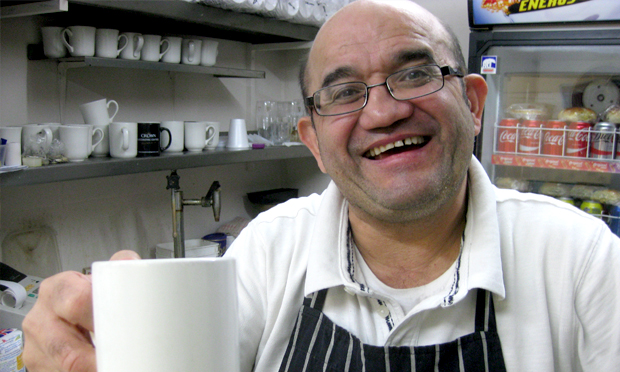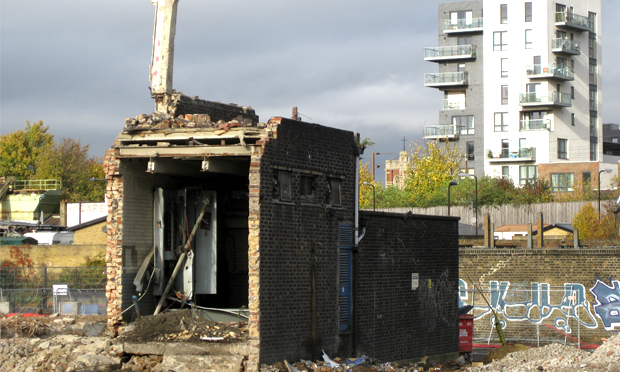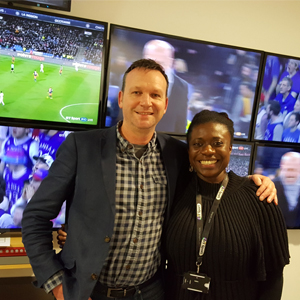“We’ll be unemployed”: meet the locals caught up in Hackney Wick’s ‘Industrial Devolution’

“It’s no good is it really?”: Franco Aviette, the proprietor of Griddlers’ Café
Standing on the platform at Hackney Wick overground station, it can almost feel like buildings are rising up in front of your eyes.
“There’s a real sense of ‘blink and you’ll miss it’ with the landscape being altered at such a pace”, as Penny Wrout of local non-profit LandSky told the Citizen. Not wanting to let such a crunch time in the area’s history go undocumented, LandSky partnered with The Yard theatre at their community centre Hub67 to interview over 40 people, from twentysomethings to nonagenarians, with a past, current or future stake in the industries cloistered in the Wick.
Read on, as Wrout gives us snippets of the voices of three Hackney generations.
Old Industry
Among the Old Industry interviews are memories about the factories which are now long-gone but which dominated working life in Hackney during the 60s and 70s. They feature people like Dot Cartwright, who worked at Lesney’s factory, making Matchbox toy cars. (The factory was the subject of a Hackney Citizen piece last year.) She recalls fiddly work where “we used to have to do 1,300 a night to earn about three pounds a week”. Margaret Loft, also a Lesney’s worker, told of how the work made her fingers hurt, “they were so sore, they used to heal up over the weekend and then you’d go back on Monday”. Nevertheless the women enjoyed the company of working together and the freedom of earning their own money.
Carpenters Road was known as ‘smelly street’ with different factories making paint, perfume and pet food. Evelyn Knowles’s relatives were wire workers, who made cages for London Zoo in The Wick. Dot Cartwright’s grandmother had eight children and worked decorating chocolates at Clarnico’s sweet factory. She would accidentally-on-purpose spill melted chocolate on her apron and at home – “it was put on the table, bang, bang, bang and the kids had the chocolate.” Other interviews highlight jobs which simply don’t exist anymore. Charlie Wiggins, a former butcher still remembers the smell of the rag and bone man, “he used to come round in a big old lorry, like a furniture lorry, oh it used to stink…he’d take all the bones off you, all the skins and give you money”.

Creative Industry
Hackney Wick is often claimed to be more densely populated with artists than anywhere else in the world, but they are by no means all painters. Marek Markowski is a master tailor making clothes for, among others, Madame Tussaud’s waxworks; “it’s more difficult because obviously you’re making for a model which doesn’t move, so everything has to be made to perfection”. Similarly Reno does bespoke work as a tattoo artist; “your own artistic history defines what you do in tattoos and what people come to you for”, he says.
Some well-established and famous artists work locally. Julian Perry moved into his studio over 15 years ago; “It’s an area that has a history of light manufacturing, and to an extent that’s carrying on, that’s what artists do, they manufacture things”. Local timber suppliers and builders’ merchants are a useful source of materials for Julian, but he worries these will disappear as the area changes. John Atherton, who until recently ran an artists’ supply shop to subsidise his own art, says it’s difficult to sustain yourself with art sales alone; “The time that it takes me to do one picture, and then what I sell it for, I don’t even get close to minimum wage”.
Service Industry
With housing development and population growth in Hackney Wick, comes an increase in workers servicing the newcomers’ needs. Richard Holley recently set up the White Post Café, open as an from the early morning as a workspace for keyboard-warriors battling on their laptops until the late hours so they can kick back by night with music. He’s loves the area, but says there are still some crucial services missing; “there are some things you traditionally associate with community which aren’t here like street lighting, bin collection, policing”.
Others, who’ve provided a service for years, recognise their businesses will inevitably be swept away by the change. Franco Aviette runs Griddlers Café, a traditional, good value, greasy spoon. His trade has been in decline since the Olympics; “We’re looking at maybe another year here if lucky. It’s no good is it really? We’ll be unemployed after ten years here”. But Paula Robb, who runs a street food trailer in Queen’s Yard, is more philosophical; “The construction workers are keeping me alive in the morning… I’ve only got 18 months but a lot of people aren’t doing well out of those 18 months and I will, so I’m a bit torn because I’ve got friends, artists and workers, getting kicked out”.
Future Industry
“I’m really conscious that nowadays in education we’re preparing children for a world of work, and we don’t actually know what that world of work is going to look like”, says Laura McPhee, Head of School at Gainsborough Primary. Children are being readied for anything, and the school needs more than just teachers to achieve that. Gainsborough’s Victorian founders would be amazed to learn it now employs a counsellor to help with wellbeing, an attendance officer to check absenteeism and a dedicated art teacher, all meeting contemporary challenges in education.

Jamie Hinghaugh, CEO of BT Sport, with interviewer Ruth Munroe
Gavin Poole, chief executive at Here East, is also responding to the employment challenges of the age. It is his job to create 5,000 jobs by filling the 1.2 million square feet built for the media during the Olympics with a variety of companies. BT Sport was their first tenant and other high tech firms have followed, attracted by the possibilities of a relationship with the universities that are also moving in. The final part of the Here East development will be 21 affordable studios. Gavin explains, “we understand that if you are trying to work in a very creative way, market forces are operating against you… this is the future for technology and for our society being established here, and we’re trying to make sure that the creative spirit which exists here is locked in”.
To hear the full interviews and many more, visit LandSky’s website
